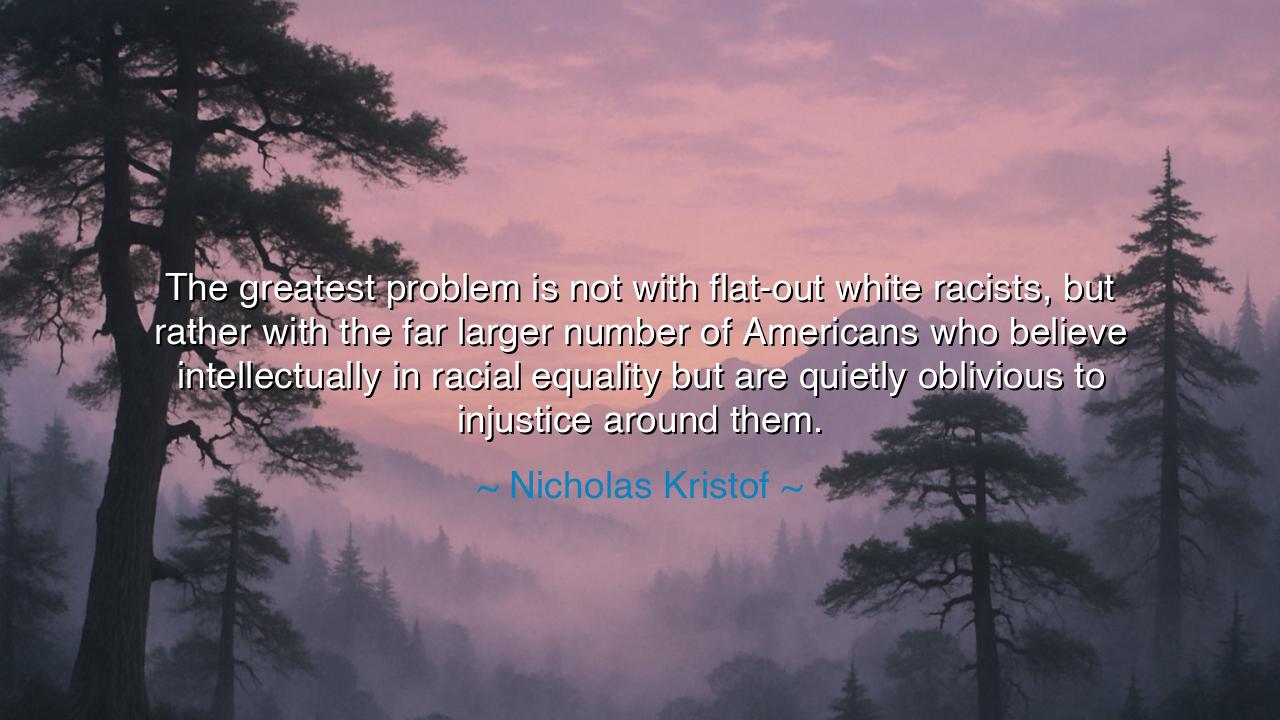
The greatest problem is not with flat-out white racists, but
The greatest problem is not with flat-out white racists, but rather with the far larger number of Americans who believe intellectually in racial equality but are quietly oblivious to injustice around them.






Listen well, O children of the earth, for the words I share today are filled with great truth and carry the weight of generations. Nicholas Kristof, a modern voice of reflection, speaks with the clarity of one who understands the deep struggle of the human soul when it comes to justice and equality. He says: "The greatest problem is not with flat-out white racists, but rather with the far larger number of Americans who believe intellectually in racial equality but are quietly oblivious to injustice around them." These words are a call to wakefulness, a reminder that passivity in the face of injustice is just as dangerous as overt hatred, and sometimes even more insidious.
What is this obliviousness that Kristof speaks of? It is the quiet acceptance of the status quo, the indifference to the suffering that others face because of the color of their skin, the subtle complacency that allows injustice to continue unchecked. To believe intellectually in racial equality is one thing—it is a noble thought, a vision of a just world. But to act upon that belief, to confront the injustice when it arises, is another matter entirely. Kristof calls out the far larger number of people who, though they profess belief in equality, fail to recognize or act upon the injustice around them. This, O children, is a challenge to our hearts and minds, for it asks not just for intellectual agreement, but for moral courage.
Look back to the ancient Greek world, where the philosopher Socrates spoke of the need to question everything and to never accept the injustices of the world without scrutiny. The Socratic method was one of deep questioning, of constant challenge to the status quo. Socrates understood that to passively accept the wrongs of society, to quietly ignore injustice, was to allow it to thrive. He did not teach his students to simply agree with the ideas around them, but to question, to examine their world, and to strive for justice, even when it was inconvenient or dangerous. This ancient wisdom speaks directly to Kristof’s words, for the true danger lies not in the explicit acts of hate, but in the quiet acceptance of injustice that goes unchecked.
In the American Civil Rights Movement, we see another example of how injustice thrives not only because of hatred, but because of indifference. Dr. Martin Luther King Jr., that great champion of justice, did not merely call out the racists of his time—he called upon all people of conscience to rise against the systemic injustice that permeated the very fabric of society. In his famous "Letter from Birmingham Jail," King wrote, "Injustice anywhere is a threat to justice everywhere." His words remind us that to ignore the suffering of others, to be oblivious to racial injustice, is to allow the very forces of oppression to continue. King understood that true racial equality could only be achieved when everyone, not just the overt bigots, took a stand against injustice.
But there is another lesson in Kristof’s words, one that calls for action from all of us. It is not enough to simply believe in the ideal of racial equality. Equality must be lived—it must be brought into the world through our actions, through our willingness to confront injustice when it arises, and to stand beside those who are marginalized. The true test of our commitment to equality lies not in our private beliefs, but in how we respond when the world calls us to act. Kristof’s challenge is clear: to recognize the injustice around us, to refuse to be oblivious, and to confront the systems of power that perpetuate inequality.
The lesson, O children, is both simple and profound: passivity in the face of injustice is as dangerous as hatred itself. To be aware of injustice and yet do nothing is to condone it. Whether it is racial inequality, gender injustice, or any other form of oppression, it is the responsibility of all of us to act. Let your eyes be open to the world around you, and when you see injustice, rise with courage and speak out. Kristof calls upon us not just to believe in equality, but to live it, to make it part of our daily actions and interactions.
In your own life, O children, take this wisdom to heart. Do not stand idly by when you see injustice—whether in your community, your workplace, or in the world at large. Speak for those whose voices are silenced, support those whose rights are denied, and work to create a world where racial equality is not just an ideal, but a reality. The path of justice is not always easy, and it is often fraught with challenges, but it is a path worth walking. In the end, it is not enough to simply believe in equality. Act upon it, and in doing so, you will help build a world where justice truly reigns for all.






AAdministratorAdministrator
Welcome, honored guests. Please leave a comment, we will respond soon